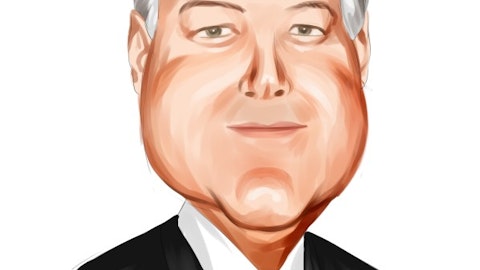Horacio Rozanski: Good morning, Louie.
Matt Calderone: Good morning, Louie.
Louie DiPalma: Horacio, near the end of last quarter, you secured a $2.2 billion contract called Morphick. That seems pretty strategic in addition to being one of your largest ever awards. Was this contract a big driver of your strong organic growth in the December quarter? And can you provide more detail about what the contract pertains?
Horacio Rozanski: So we were a little limited in terms of what we can say about that particular contract. It’s – I guess, what I will say is it’s still – it’s over piece of all of the work that we keep talking about where we’re bringing leading-edge technology into existing mission sets, programs of that size ramp slowly. I think the message I would likely to take away is the growth that we’re seeing is broad-based. That’s obviously a defense contract. And as you can see, both civil and security also posted very strong growth. So we’re seeing strong demand across really, I can’t say it’s every single part of our business, but lots of aspects of our business. And the team is doing a great job of hiring against our demand, bringing in the right people, with the right clearances and the right technical expertise, so that we can ramp up and continue the momentum.
Louie DiPalma: Great. And for Matt, I think you mentioned the possibility of accelerating M&A in the future quarters. Should we expect acquisitions to be small sub $1 billion type so that they are easily digestible? Or do you have any aspirations for a much larger transformative acquisition?
Matt Calderone: Thanks, Louie. Never say never. But I think right now, we’re more focused on small to mid sized tuck-ins that are strategic accelerants. We’re really pleased with our capital deployment to date, deployed $510 million in the quarter, including EverWatch. And as Horacio said, they’ve got some short-term hurdles they need to overcome on the supply side. But from a demand perspective and in terms of long-term strategic value, we really see it as an opportunity for us to transform portions of our intelligence business. So we’re working it. We’ve got a pipeline. As you know, the M&A market has been and relatively slow in the past couple of quarters for a handful of macroeconomic reasons. But we’re going to play the game that’s in front of us. And the strength of our balance sheet just gives us a lot of flexibility to do that.
Louie DiPalma: Thanks, Matt. And thanks, Horacio.
Horacio Rozanski: Thanks, Louie.
Operator: One moment. And our next question will come from Cai von Rumohr of Cowen. Your line is open.
Horacio Rozanski: Hi, Cai, good morning.
Cai von Rumohr: Thanks so much. Yes. Good morning, guys. So you mentioned protest is a reason for the soft bookings. Could you walk through the large Intel contract, is that one that you were awarded and now is being – is under protest and maybe give us some color on some of the others, too, if you could?
Horacio Rozanski: I think, generally speaking, this is what I can tell you. I think the contract that you’re describing, I mentioned briefly last call and Matt talked about it in the prepared remarks, it relates to our cyber work in the Intel market and has overlap with some of our existing contract. The award was pulled back and it’s been re-evaluated. So it’s not technically under protest. And so we – as you know, because you’ve followed us for a very long time, we generally don’t comment on specific procurements, while they’re under evaluation. Here’s what I can tell you about the processing well, about this dynamic in particular and then the broader environment. The – as you know, we’re not demand constrained. We have $30 billion in backlog.





